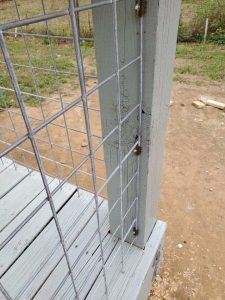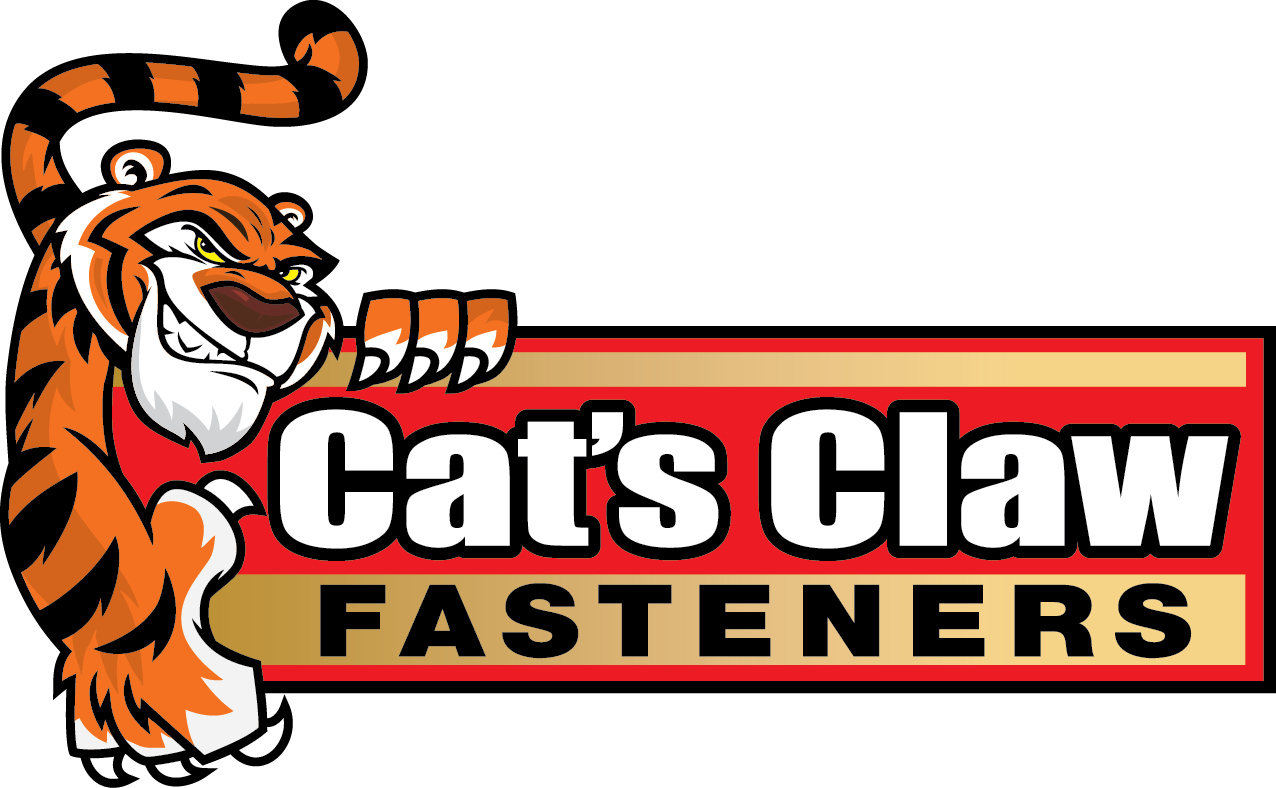
Wire mesh and woven fencing are popular choices for a variety of reasons, from residential properties to commercial spaces. Whether you’re looking to add privacy, security, or aesthetic appeal to your property, wire mesh and woven fencing can be a great choice. However, selecting the right fasteners and nails for your fencing is essential to ensuring that it is long-lasting, effective, and visually appealing. Here we’ll discuss some of the key factors to consider when selecting heavy-duty fasteners and nails for wire mesh and woven fencing.
Secure Your Fencing Right: Cat’s Claw Fasteners
It’s important to understand the type of wire mesh or woven fencing that you’re using. There are a variety of materials available, from traditional wood and metal fencing to newer, eco-friendly options such as bamboo and recycled plastic. Each material has its own unique differences and requires different types of fasteners and nails to properly secure it.
If you’re using metal wire mesh or woven fencing, stainless steel fasteners are a popular choice due to their resistance to rust and corrosion, or consider a Heavy Duty Fastener, Cat’s Claws, they have a bronze dacrament (a coating stronger than typical powder or cerakote coatings) that is 1000-hour salt water tested. Not only are they durable, but they’re perfect for attaching wire to wood or plastic. These fasteners are ideal for outdoor applications, as they can withstand exposure to the elements and provide a durable and long-lasting hold. Zinc-plated fasteners are another option, offering a lower cost alternative to stainless steel while still providing some protection against rust and corrosion.
When it comes to wooden fencing, selecting the right type of wood is crucial to ensuring that your fence is long-lasting and effective. Cedar and redwood are popular choices for outdoor fencing as they are naturally resistant to decay and insect damage. Pressure-treated lumber is also a common option, providing additional protection against rot and decay.
Aesthetics and Strength: Choosing Fasteners for Your Fencing
In addition to selecting the right type of Heavy Duty Fastener and nails, it’s important to consider the overall design and aesthetic of your property when choosing the style of fasteners. For example, if you’re installing fencing around a modern or contemporary building, you may want to opt for sleek, minimalist fasteners that complement the design of the building. Similarly, if you’re installing fencing around a historic property, you may want to choose traditional, ornate fasteners that match the property’s architectural style. Or as we mentioned above about Cat’s Claws, they can be painted to match any decor- they can be spray painted, powder coated, enamel coated, all to match whatever look you want!
Another important factor to consider is the size and thickness of the wire mesh or woven fencing that you’re using. The thickness of the wire mesh or fencing will determine the size and type of fasteners and nails that are required to properly secure it. Thicker wire mesh and fencing may require heavy-duty fasteners and nails to provide a secure and stable hold.
Efficient Tools for Fencing: Cat’s Claw and More
When installing wire mesh or woven fencing, it’s important to use the correct tools and equipment for the job. A hog ring plier is a specialised tool that is used to close hog rings around wire mesh fencing. While we still have access to this old-fashioned way of doing things, we sure like the Cat’s Claw fence claw- it’s a lot less hassle (not to mention less blood, sweat, and tears). Unlike the old hog rings that require 3 arms and a spare child to holler at during installation, the Cat’s Claw fastener zips right in- with ONE hand! Just pick up your favorite impact driver, use the bit that comes in every bottle, and install the Cat’s Claw to hold the wire! Without these, it can be difficult to properly secure the wire mesh, resulting in an unstable and ineffective fence. A fence stretcher is another tool that can be helpful in ensuring that the wire mesh or fencing is properly tensioned and securely fastened.
If you’re using wooden fencing, a post hole digger and level will be necessary to ensure that your fence posts are properly installed and level. A circular saw or miter saw may also be needed to cut the wooden posts and rails to the correct size and shape. Additionally, a drill and screws may be needed to attach the wooden rails to the posts.
It’s also worth considering the environmental impact of the materials you choose for your fencing. For example, if you’re looking for an eco-friendly option, bamboo fencing is a sustainable and renewable choice that offers a natural look and feel. Recycled plastic fencing is another eco-friendly option, providing a durable and long-lasting solution that is made from recycled materials. These options are not only environmentally friendly but can also offer a unique and eye-catching design to your property.
Another factor to consider is woven fencing which uses horizontal and vertical wires that are woven together. These wires are thicker and stronger than those used in wire mesh, making woven fencing an ideal choice for high-security applications. It is commonly used in areas such as airports, military bases, and prisons.
When it comes to choosing the right fasteners and nails for your wire mesh or woven fencing project, there are a few things to consider. The first is the material of the fastener or nail. Galvanized steel is a popular choice as it is durable and rust-resistant, making it suitable for outdoor use. Stainless steel is another option, although it can be more expensive.
Another consideration is the length of the fastener or nail. It is important to choose a length that is appropriate for the thickness of the wire mesh or woven fencing. This is precisely why the Cat’s Claw fence claw comes in 1.5 inches and 2 inches: because hardwoods typically don’t need the extra holding power that softwoods do. The extra half inch provides a better grip on softwoods and also on old posts that are prone to rotting. Using a fastener or nail that is too short may provide insufficient support, while using one that is too long can cause damage to the fence or mesh.
In addition to length, the type of fastener or nail is also important. Common options include u-nails, hog rings, and fence staples. Fence staples are commonly used for attaching woven fencing to wooden posts. U-nails and hog rings were what we put up with in the 1900’s.
Cat’s Claw Fence Claws: Modernize Your Fencing Experience!
It’s a new century, folk! Cat’s Claw fence claws replace all the headaches that each of these outdated pieces of tech were prone to, mainly the most important one (bashing your fingers). And with that masochistic hobby behind us, you get added strength, durability, simplicity, and style.
When installing fasteners or screws, it is important to space them out evenly along the length of the fence or mesh. This will ensure that the fence is properly supported and that there are no weak spots. It is also important to use the appropriate tools, fencing pliers, to ensure that the fasteners or screws are properly secured. Fence staples are commonly used for attaching woven fencing to wooden posts, although new technology provided by Cat’s Claw makes fence staples totally obsolete. Nudge, nudge, hint, hint.
When it comes to heavy-duty fasteners and nails for wire mesh and woven fencing, it is important to choose the right materials and sizes for your project. Whether you are installing a fence around your backyard or securing a high-security area, selecting the right fasteners and nails is essential for the safety and durability of your project. With the right tools and techniques, you can ensure that your wire mesh or woven fencing project is a success.
We welcome your questions and feedback! Feel free to contact Cat’s Claw Fastener and reach our Head Cat Collector, Ralph, via email at ra***@***************rs.com. Stay in the loop with our latest updates and blog posts. Follow us on Facebook, Instagram, Pinterest, and Youtube for more!
About the writer: Jake
Jake Walker is Cat’s Claw Fasteners go-to guy for anything related to fencing, gates, installation, and materials! Thanks to his background as a professional fencing installer as well as content writer, combined with a bit of his British twang and ideas from across the pond, he keeps the audience captive. Don’t worry if you don’t understand his British slang or sense of humour; we don’t always understand him, and he doesn’t always fully understand us.
Get in touch of Jake via email at ra***@***************rs.com , be sure to use ATTN:Jake if you have any questions about all thing social, writing, fencing, or just want to make fun of his British accent.
Read Next: The Different Types of Wood for Wire Fencing: Which Is Best?

© 2024 Cat's Claw Fasteners, LLC | All Rights Reserved - Built by Redemptive Software